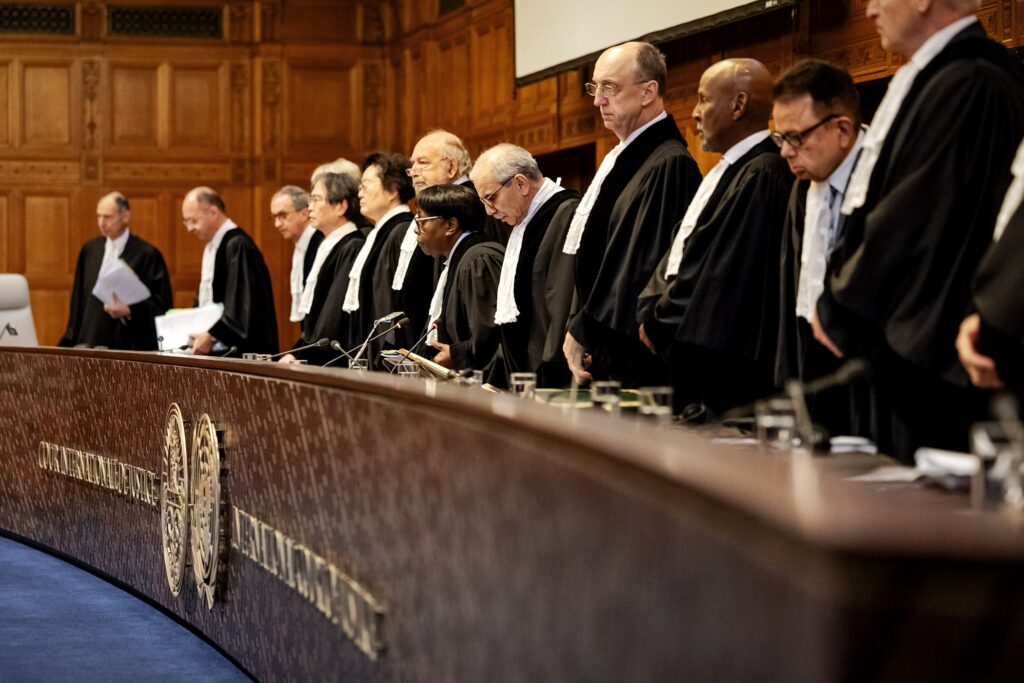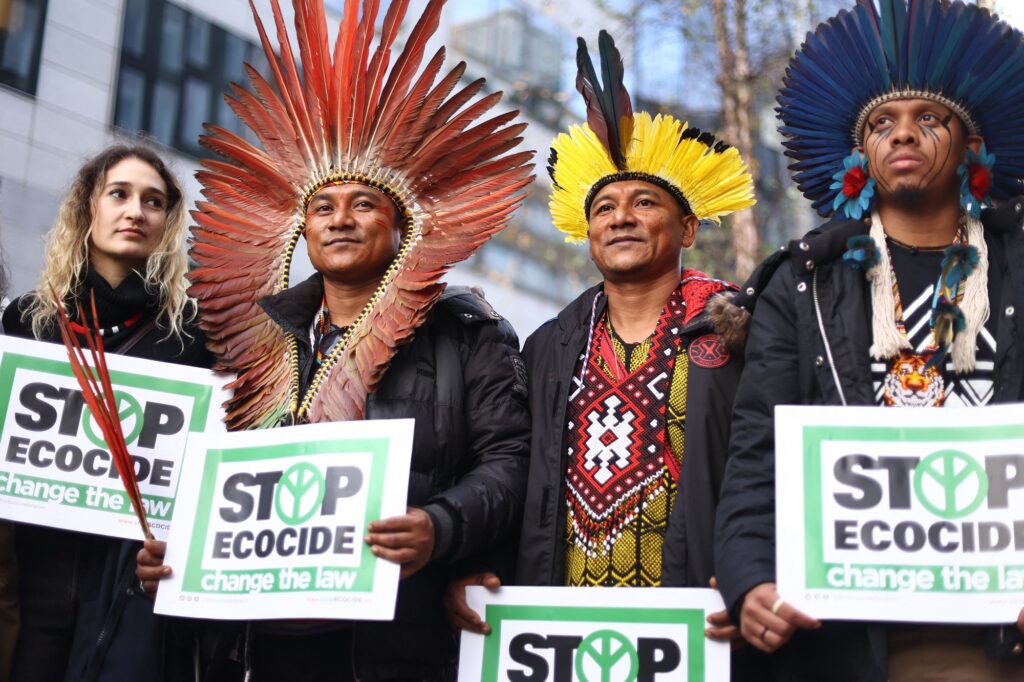
Executive Director & Senior Fellow
Head, Blue Carbon & Climate Change Program
Cover Image Source: Getty Images, Royalty-Free
Climate change litigation has emerged as a powerful tool in the global fight against the climate crisis. With its ability to hold states, corporations, and other stakeholders accountable, climate litigation is becoming a cornerstone of climate governance. Recent cases brought before international and regional legal institutions, such as the International Tribunal for the Law of the Sea (ITLOS) and the International Court of Justice (ICJ), underscore the transformative potential of legal actions in addressing climate-related challenges. The trends and impacts of climate litigation deserve careful examination, including how it reshapes legal principles, drives accountability, and influences policy.
Recognizing Climate Change in International Law
International courts are increasingly addressing climate change as a transboundary issue requiring legal interventions. The ICJ’s recent advisory opinion request, initiated by the UN General Assembly in 2023, seeks to clarify states’ obligations under international law to address climate change. Similarly, ITLOS has issued the advisory opinion considering a request by the Commission of Small Island States on Climate Change and International Law to define states’ responsibilities under the United Nations Convention on the Law of the Sea (UNCLOS) to mitigate climate impacts on marine environments.
These developments highlight a growing recognition of climate change as a matter of international law. By framing climate change within existing legal frameworks, these cases set precedents for addressing its multifaceted impacts on ecosystems, human rights, and state responsibilities.

Climate Litigation as a Tool for Accountability
One of the most significant trends in climate litigation is its role in holding states accountable for their commitments under international agreements such as the Paris Agreement. The landmark Urgenda Foundation v. The Netherlands case in 2019 established a precedent for states’ obligations to reduce greenhouse gas emissions to protect human rights. The Dutch Supreme Court ruled that inadequate climate action violated the state’s duty to protect citizens’ rights to life and family life under the European Convention on Human Rights.
This case has inspired similar actions across Europe, including ongoing proceedings at the European Court of Human Rights (ECHR). These cases emphasize that states must align their climate policies with international human rights obligations, reinforcing accountability mechanisms at both national and international levels.
Expanding Legal Principles in Climate Litigation
Climate litigation is expanding the scope of legal principles, incorporating concepts such as intergenerational equity and the rights of future generations. The Juliana v. United States case, for example, argues that failing to address climate change violates young people’s constitutional rights to a safe environment. Although the case faces procedural hurdles, it has elevated the discourse on generational justice in the context of climate action.
Similarly, the Human Rights Committee’s decision in Ioane Teitiota v. New Zealand recognized climate change as a potential ground for asylum claims. This landmark decision underscores the evolving legal recognition of climate-induced migration as a human rights issue.
Impact on Corporate Behavior and Environmental Governance
Climate litigation is not limited to state accountability; it increasingly targets corporations for their contributions to climate change. The Milieudefensie et al. v. Royal Dutch Shell case in 2021 marked a turning point by ordering Shell to reduce its emissions by 45% by 2030. This ruling highlighted the legal risks corporations face if they fail to align their operations with climate goals.
Corporate-focused litigation also plays a significant role in advancing environmental governance. For instance, cases before the Colombian Constitutional Court have recognized the rights of the Amazon River ecosystem and addressed corporate accountability for deforestation and environmental degradation, linking these actions to broader climate impacts. Such cases highlight a growing shift toward integrating corporate responsibility into global climate governance frameworks.
Catalyzing Policy Change and Raising Awareness
Climate change litigation has proven to be an influential force in driving policy change and raising public awareness about the urgency of climate action. Also, climate litigation often transcends the courtroom, influencing public and political narratives.
A notable example is Leghari v. Pakistan (2015), where a farmer challenged the Pakistani government for its failure to implement national climate policies. The Lahore High Court ruled in favor of the petitioner, ordering the government to establish a Climate Change Commission to ensure effective implementation of climate adaptation and mitigation measures. This landmark case not only advanced Pakistan’s policy landscape but also set an example for other nations grappling with similar challenges.
Beyond policy reform, climate litigation has played a pivotal role in elevating the climate crisis in public discourse. High-profile cases like Juliana v. United States, where young plaintiffs sued the U.S. government for failing to protect their constitutional rights to a safe climate, have captured global attention. While the case faced procedural challenges, it sparked widespread discussions about intergenerational equity and the government’s role in addressing climate change.

Challenges in Climate Litigation
Despite its promise, climate litigation faces significant challenges. Jurisdictional limitations often hinder international courts from addressing climate disputes comprehensively. For instance, contentious case procedures at the ICJ remain underutilized due to states’ reluctance to bring climate disputes to the court.
Evidentiary burdens also pose obstacles, particularly in cases requiring scientific proof of causation between emissions and specific climate impacts. Regional courts in Latin America, for example, face difficulties in addressing transboundary environmental harms due to limited technical resources and political resistance.
Emerging Trends and Future Directions
Climate litigation is evolving to address emerging issues such as loss and damage, ocean protection, and carbon neutrality pledges. The push for recognizing ecocide as an international crime under the Rome Statute exemplifies this trend. By criminalizing severe environmental destruction, this initiative seeks to establish stronger deterrents against climate-related harms.
Additionally, domestic litigation in Global South countries is asserting the rights of vulnerable communities against both states and corporations. For instance, Nigeria’s stalled solar energy projects highlight the need for legal mechanisms to overcome barriers to private investment in climate initiatives. Such cases underscore the importance of legal frameworks in fostering equitable climate action.

The Role of Multilateral Development Banks (MDBs)
Multilateral development banks (MDBs) play a vital role in addressing the financial dimensions of climate change litigation. By mobilizing resources for renewable energy projects and climate resilience initiatives, MDBs help governments and corporations meet the legal obligations often imposed through climate litigation. Institutions such as the Asian Infrastructure Investment Bank (AIIB) and the African Development Bank (AfDB) exemplify this role by channeling investments into sustainable development. For instance, the AfDB’s Desert to Power initiative seeks to transform the Sahel into a solar energy hub, showcasing how MDBs align their financial strategies with the goals of climate mitigation and adaptation.
MDBs also address one of the critical barriers to climate litigation outcomes: the lack of financing for implementing judicial mandates. Legal rulings often require significant investments to fulfill obligations such as emission reductions or ecosystem restoration. By blending public and private resources and offering guarantees to de-risk investments, MDBs enable stakeholders to translate litigation outcomes into actionable projects. This ensures that the financial burden does not disproportionately fall on vulnerable communities, aligning MDBs’ efforts with the principles of equity and justice that underpin much of climate litigation.
Implications for Maritime Disputes
The growing wave of climate change litigation could also have profound implications for existing maritime disputes. As sea levels rise and marine ecosystems face unprecedented stress, states may increasingly turn to international courts and tribunals to address conflicts over maritime boundaries, resource rights, and environmental responsibilities. For instance, disputes over Exclusive Economic Zones (EEZs) and continental shelf claims may become intertwined with legal arguments about state responsibilities to mitigate climate impacts under UNCLOS. The inclusion of climate-related arguments in maritime disputes could reshape traditional interpretations of international law of the sea, introducing new principles rooted in sustainability, intergenerational equity, and the protection of vulnerable coastal communities. This evolution underscores the interconnectedness of climate governance and maritime security, necessitating a more integrated legal framework to address these overlapping challenges.
Conclusion
Climate change litigation is transforming the global response to the climate crisis. By holding states and corporations accountable, expanding legal principles, and catalyzing policy change, it has become an indispensable tool for climate governance. Yet, significant challenges remain, including jurisdictional limitations and evidentiary burdens, which must be addressed to fully realize its potential.
Emerging trends in climate litigation, alongside the expanding role of MDBs, underscore the power of legal actions to drive equitable and sustainable outcomes. As the world confronts the escalating impacts of climate change, the legal system offers a crucial avenue for fostering accountability, innovation, and resilience.
The growing prominence of climate litigation is also reshaping the legal landscape. It challenges legal practitioners to navigate uncharted territories in international and domestic law, requiring the integration of environmental science, human rights principles, and legal doctrines. This interdisciplinary approach is essential for addressing complex issues such as liability, causation, and transboundary impacts. In doing so, the legal community plays a pivotal role in advancing accountability and promoting equitable climate governance, ensuring that justice remains at the heart of the global climate response.

The Institute for China-America Studies is an independent nonprofit, nonpartisan research organization dedicated to strengthening the understanding of U.S.-China relations through expert analysis and practical policy solutions.
1919 M St. NW Suite 310,
Washington, DC 20036
icas@chinaus-icas.org
(202) 968-0595
© 2025 INSTITUTE FOR CHINA-AMERICA STUDIES. ALL RIGHTS RESERVED.
Private Climate Action Needs Government Leadership to be Truly Successful